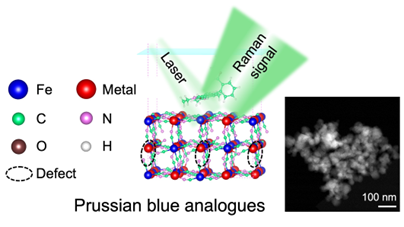DATE2024.10.31 #Press Releases
Convenient and sensitive chemical analysis with Hokusai Blue
—— A new chemical method with potential sensing applications in criminal investigation, environmental safety, food testing, medicine, and beyond!——
Summary
A research team led by Professor Keisuke Goda at the University of Tokyo Chemistry Department and by the Chief Scientific Officer of LucasLand, Inc. has revealed that nanoparticles analogous to Prussian blue (also known as Hokusai blue or Hiroshige blue, a pigment used in traditional Japanese ukiyo-eh woodblock prints) can be used as effective substrates for surface-enhanced Raman spectroscopy (SERS). These “Prussian blue analogue” nanoparticle SERS substrates demonstrate superior uniformity, durability, fluorescence quenching, preservation, and biocompatibility compared to those of previous studies. In the study, the authors found that crystal defects in Prussian blue analogues (generated by adding different metals) contribute to excellent SERS performance (see Figure). Since the SERS performance varies based on the type of added metal, the SERS performance can be controlled by deliberate modification of the formation of crystal defects. In addition, SERS substrates with these Prussian blue analogue nanoparticles exhibit extremely high enhancement factors (108-fold), enabling their application to ultra-sensitive analysis of biomolecules and other substances. The results of this research are expected to help overcome various problems in chemical analysis and sensing and open up a new field of “anywhere, anybody: easy, in-situ, low cost chemical analysis”.

Figure:schematic of this study
SERS can be measured using Prussian blue analogue nanoparticles (rightmost inset: electron micrograph of substrate) whose properties are controlled by introducing different metals.
Journals
-
Journal ACS Nano Title of paper


